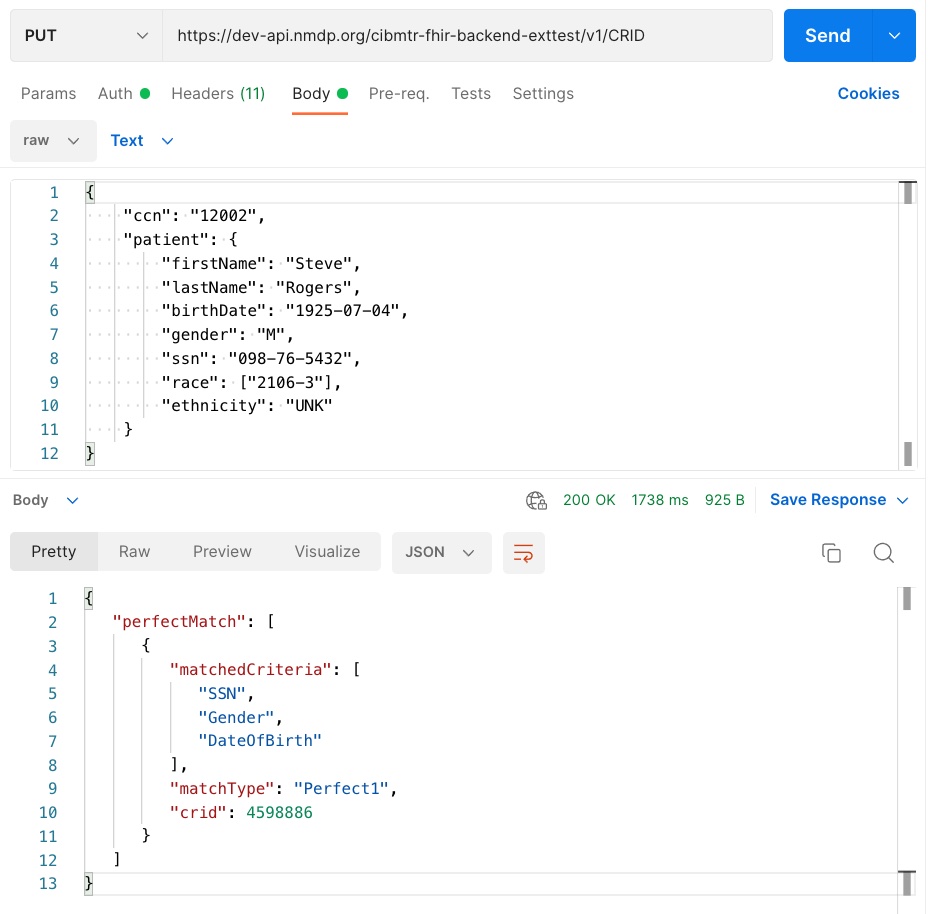CIBMTR Reporting Implementation Guide
0.1.9 - Trial Use 1
CIBMTR Reporting Implementation Guide
0.1.9 - Trial Use 1
This page is part of the CIBMTR Reporting Implementation Guide (v0.1.9: Release) based on FHIR (HL7® FHIR® Standard) R4. This is the current published version. For a full list of available versions, see the Directory of published versions
The client must either search for an existing patient previously registered with CIBMTR or register a new one. In both scenarios, the client will receive a FHIR Patient resource via a special $crid-assignment operation, which assigns a CIBMTR Research Identifier (CRID). This CRID is used as the patient identifier for all future FHIR data submissions.
CIBMTR provides a dedicated FHIR Patient service with a special $crid-assignment operation to securely handle the submission of personally identifiable information (PII). Data submitted through this API is subject to enhanced protections within CIBMTR to minimize unnecessary exposure of PII. For all subsequent FHIR submissions, the CRID serves as the primary patient identifier, and any PII is removed from the FHIR resources before being stored in the CIBMTR FHIR servers.
The CRID API uses a POST request at the following case-sensitive endpoint URLs:
POST <base URL>/<resource_version>/Patient/$crid-assignment
In Parameters:
| Name | Scope | Cardinality | Type | Binding | Profile | Documentation |
|---|---|---|---|---|---|---|
| patient | 1..1 | patient | A patient parameter with Patient Fhir resource | |||
| ccn | 1..1 | string | A ccn parameter, center number |
Out Parameters:
| Name | Scope | Cardinality | Type | Binding | Profile | Documentation |
|---|---|---|---|---|---|---|
| identifier | 1..* | identifier | Cibmtr crid identifer |
The authorization key and bearer token must be included in the request as mentioned in the previous section. For the body of the POST request, the following data fields are requested:
Five required attributes
Optional attributes (possibly present)
Complete list of payload options for CRID registration is shown below.
{
"resourceType": "Parameters",
"id": "example",
"parameter": [
{
"name": "patient",
"resource": {
"resourceType": "Patient",
"id": "example",
"name": [
{
"use": "official",
"family": "FamilyName",
"given": [
"FirstName",
"LastName"
]
}
],
"gender":"string",
"race":"string",
"birthdate":"date",
"meta": {
"security": [
{
"system": "http://cibmtr.org/codesystem/transplant-center",
"code": "<center_number_ccn>"
}
]
}
}
},
{
"name": "ccn",
"valueString": "string"
}
]
}
OMB Catagory Race Codes
| Race Value Code | Description |
|---|---|
| 1002-5 | American Indian or Alaska Native |
| 2028-9 | Asian |
| 2054-5 | Black or African American |
| 2076-8 | Native Hawaiian or Other Pacific Islander |
| 2106-3 | White |
| ASKU | Not Reported |
| UNK | Unknown |
OMB Catagory Ethnicity Codes
| Ethnicity Value Code | Description |
|---|---|
| 2135-2 | Hispanic or Latino |
| 2186-5 | Non Hispanic or Latino |
| UNK | Unknown |
Because the CRID API is available as a POST request, submitting the same data twice does not re-register the patient, but rather will return the parameter response with 200 OK.
The response payload of the CRID Service API is a JSON object that contains the CRID number (lower pane in Figure). The CRID number is then used for all other data references to the registered patient.
 |
|---|
| Figure 1: Example CRID registration POST request with JSON body payload (top pane) and response payload (bottom pane) |
patient.json Example
{
"resourceType": "Parameters",
"parameter": [
{
"name": "resource",
"resource": {
"resourceType": "Patient",
"meta": {
"security": [
{
"system": "http://cibmtr.org/codesystem/transplant-center",
"code": "rc_12001"
}
]
},
"name": [
{
"use": "official",
"family": "Ranii",
"given": ["sdascvdi"]
}
],
"gender": "female",
"birthDate": "2010-02-04"
}
},
{
"name": "ccn",
"valueString": "12001"
}
]
}
Python Example
#!/usr/bin/env python3
import json
import requests
from pathlib import Path
# Load patient object from patient.json
with open('patient.json') as f:
patient = json.load(f)
#print(patient)
tokenfile = Path('token.txt') # Bearer token was previously captured in token.txt
authstring = 'Bearer ' + tokenfile.read_text()
headers = {'Authorization': authstring,
'Content-Type': 'application/json'}
r = requests.post('https://qa-internal-api.nmdp.org/cibmtr-fhir-backend/v1/r4/Patient/$crid-assignment',
json=patient,
headers=headers)
if r:
print(json.dumps(r.json(), indent=4))
else:
print(f"Request failed with status code {r.status_code}")
print("Response body:")
print(r.text)